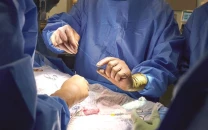Dengue mosquitoes still a menace indoors
2-3 cases diagnosed at each hospital daily, says Health Dept spokesman.

But experts say that Aedes aegypti cannot survive in temperatures below 20 degrees. “Hakim must have been bitten by a dengue mosquito indoors,” said a doctor who treated Hakim.
Public hospitals have received a trickle of dengue patients all winter. “Two or three cases are being diagnosed at each public teaching hospital every day,” said a Health Department spokesman.
He said the department was not compiling daily reports of dengue infections like it did during the outbreak late last year, but it was maintaining a record of total infections.
“The temperature outside is not suitable for dengue mosquitoes but they can live comfortably in heated houses or buildings. They lay eggs in empty bottles and cans and hatch when they get water,” said Dr Masood Sheikh, president of the Pakistan Medical Association.
He said people with warm homes should take precautions like putting on mosquito repellent. “They should take as much care as they took during the peak of the dengue epidemic,” he added.
Dr Sheikh said cleanliness was important as it denied mosquitoes places to lay eggs. He said that there would likely be a rise in the mosquito population after rainfall in February or March.
While adult mosquitoes can’t survive in temperatures below 20 degrees, their eggs have no such trouble, said Dr Muhammad Aslam Khan, who is head of the Genetics Department at the University of Health Sciences (UHS). He said it was possible that the virus was also being spread by mosquitoes other than Aedes aegypti and a team at the UHS was conducting research to identify all the types of mosquitoes that can transmit the virus. He said people should not throw empty bottles and cans outside their houses.
Entomologist Abdul Ghaffar advised people with warm houses to spray insecticide indoors. He said dengue could not be entirely eliminated, but it could be curtailed. “We need to realise that nowhere in the world has dengue been completely eliminated after it became an epidemic. Random cases of dengue will keep on occurring but keeping our houses clean, coupled with prompt preventive measures by the government, can prevent the next outbreak from becoming an epidemic,” he said.
Dr Mubashir Malik, the health director for the Centre for Communicable Diseases, said that an insecticide spray and fogging campaign would be completed before February 10, but people needed to take responsibility for insecticide sprays indoors.
Post Graduate Medical Institute (PGMI) Principal Dr Tariq Salahuddin said that a set of standard operating procedures was being prepared in consultation with Pakistani experts that were trained abroad. He said raising awareness of preventive measures could greatly curb the disease. He was addressing a delegation of nurses who went on training courses in Thailand and Sri Lanka.
Published in The Express Tribune, January 9th, 2012.



















COMMENTS
Comments are moderated and generally will be posted if they are on-topic and not abusive.
For more information, please see our Comments FAQ